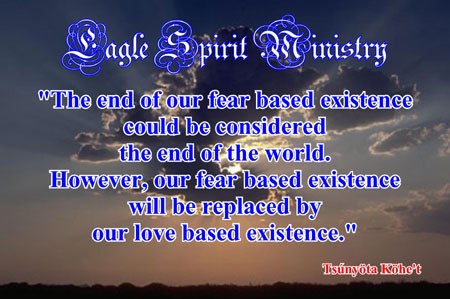 |
 |
||
|
|
|||
|
Presented by…
|
|||
|
|
|||
|
In the film 'Meet Joe Black' when the angel of death decided to leave his heavenly abode and take a brief vacation on Earth, he was quite surprised to be informed by his rather nemesis character that there are two things in this life that are certain; death and taxes, both stirring an element of fear in those who dwell on them too long. Death, it appears, is something that all but a few avatars in the annals of time have had to endure. The concept of death is nothing new, as death has been with us since the first beings dwelled on Earth. We must all come to terms with the evolutionary process of birth, growth, decay and finally death. Ancient cultures have had such a fascination of this final act of living that volumes, such as the Tibetan and Egyptian Books of the Dead, have been written in an attempt to depict man's descent into the underworld. |
||
 |
||
|
One of the most poetic illustrations in the west is 'The Divine Comedy', written by Dante in the early 14th century. In this epic tale, Dante describes man's death where he descends the depths of Inferno (Hell); gains redemption in Purgatory, and eventually through atonement is awarded the privilege to ascend the stairs leading to Paradise (Heaven). Although literary scholars agree that this tale did not refer to the afterlife, even if viewed from the next, it is nevertheless an insightful epic poem that has provided much inspiration for well over six centuries and undoubtedly many more to come. Before Descartes, the 17th century philosopher and mathematician, uttered those famous words Cogito, ergo sum, 'I think, therefore I am' the world was shrouded in mystery as people relied heavily on myth to explain those things that they could not rationalise. When the church had no other alternative but to relinquish the inordinate control it had over the activities of Western man, the time was right to explore the world of science. This science of reason is what has predominated man's thinking for the past three centuries, thus leaving little room to explore the more perceptive areas of life, such as death. |
||
 |
||
|
In Biblical lore, death was of such finality that the entire New Testament was based upon the salvation of the soul to assure a pleasant afterlife. The only person who appears to have escaped death was Enoch, who was taken to walk with God at the age of 365, which is of esoteric significance because it is the number of days in a year. |
||
 |
||
|
To the ancient Egyptians, Anubis was the god who introduced the dead to the otherworld, and prepared them to meet the judge god, Osiris. Anubis had a human body and the head of a jackal, and was known as the embalmer. Myth has it that he helped his twin sister and wife, Isis to put together the pieces of the corpse of Osiris when he was killed and dismembered by his brother and rival, Seth. When Anubis had embalmed Osiris's body he assisted Isis to resurrect him long enough to become impregnated. Nephthys, Egyptian goddess of sterility, was the sister of Isis and Osiris, and the twin and wife of Seth, whom she hated. Nephthys was Osiris's mistress. Nephthys did not approve of Seth killing Osiris, and helped Isis locate Osiris's body. Both Isis and Nephthys were sisters and lovers to Osiris, and their histories have gotten mixed up throughout the ages. Both goddesses were given guardianship over Osiris's tomb; one was placed at the head, and the other at the foot. |
||
|
|
||
|
Because the Greeks and Romans lived in such close proximity to each other it should come as no surprise that they incorporated into their lives many of the same gods. The Greeks called the god of death Hades, while the Romans referred to this entity as Pluto. Hades was the son of Cronus and the brother of Zeus and Poseidon. When Zeus overthrew his father he divided dominion of the universe into three regions; Zeus ruled over the heavens, Poseidon the sea, and Hades was allocated the underworld. Hades was feared and hated by the mortals and abhorred by the gods. Hades dour disposition was certainly a reflection of the fact that Hades was incensed at having been given control over such an inhospitable place. Hades fell in love with Kore, but Zeus forbade him to marry her, so Hades kidnapped Kore and brought her down to the underworld to stay with him. Demeter, Kore's mother, searched for Kore far and wide to no avail and, as a result of her sadness, Demeter caused the earth to become cold and barren. Zeus eventually demanded that Hades return Kore to her mother, but since Kore had already eaten a seed from a pomegranate she was forever bound to Hell. A deal was struck between Zeus and Hades that half of the year Kore would reside in the underworld, and the other half she could return to Demeter on the earth, thus explaining why everything dies during the winter months. |
||
|
|
||
|
Greek lore portrays the concept of death in the story of Orpheus and Eurydice. Orpheus was the most gifted musician who ever lived. His wife Eurydice was so lovely that she attracted the unwanted attentions of a man named Aristaeus. When Eurydice fled his advances, she trod on a serpent that bit her and died from its poison. Beside himself with sorrow, Orpheus travelled to the underworld to win her back. When Orpheus made it to the throne of death, Kore begged Hades to listen to Orpheus' plea. It was agreed that Eurydice could follow Orpheus to the upper world, on the condition that Orpheus did not look at Eurydice until she walked once more in the Sun. Orpheus played tunes of love and joy as he led Eurydice back to life, never once looking back, but when he reached the sunlight he turned to make sure Eurydice was still there. He looked around and saw Eurydice nearly at the entrance to the tunnel, but as he glimpsed her she frayed once more into a thin ghost, lost forever. |
||
 |
||
|
The Babylonians attributed the concept of death to both a male and female entity. Ereshkigal, the daughter of Anu, built herself an independent and terrible kingdom in hell. The only way that the gods themselves could enter this kingdom was to be stripped of their dignity, and they risked being kept prisoner, because of Ereshkigal's ruthlessness, she had cut herself off from her peers to the extent that she could not take part in the celestial banquet. Ereshkigal did, however, send a messenger to fetch her share of the celestial banquet. |
||
 |
||
|
Nergal, son of Enlil, arrogant and impetuous himself, refused to sit down in the assembly of the gods with this emissary from beyond the tomb. When Ereshkigal heard of Nergal's attitude, she became angered and demanded an apology from the insolent god. Not one to shy away from a good scrap, Nergal went to Hell, escorted by 14 demons who allowed him to pass safely through the seven gates of the infernal world. When he reached his mistress, he behaved with such grace and charm that he was able to seduce her and return unharmed. When Ereshkigal realised that she had been misled by Nergal, she sent a missive to Anu and demanded that Nergal return so that he could be put to death, and threatened the world with the greatest calamities if Nergal did not return. Once again, Nergal descended into the depths of Hell, but this time he showed his violent streak and determined that if he must go to Hell then he would be master of Hell. When Nergal reached Ereshkigal, he seized her by the hair and threw he to the ground. Ereshkigal begged for mercy and promised to marry her aggressor if he would let her go. Through this union, Nergal was able to acquire Ereshkigal's power in the underworld. |
||
 |
||
|
After having been introduced to some of humanity's various figures that have been used to explain the concept of death and rationalise their own sense of mortality, it is interesting to note that many of us have drifted away from esoteric topics in preference to the exoteric. In a perfect society, our intuitive awareness would progress at about the same rate as our reasoning powers, but this, however, does not appear to have been the case if historical records are an accurate reflection. Prior to the 17th century people were primarily influenced by superstition and could easily be manipulated by the church. After this time, however, man has endeavoured to free himself from the pseudo religious shackles that hampered man's technological progression, and in effect took a 180 degree turn. Reason became man's religion of choice. In an ideal world, both spiritualists and rationalists would agree to disagree, and accede that a touch of both philosophies is essential for harmonious living.
Tracy Porter |
||
 |
||


